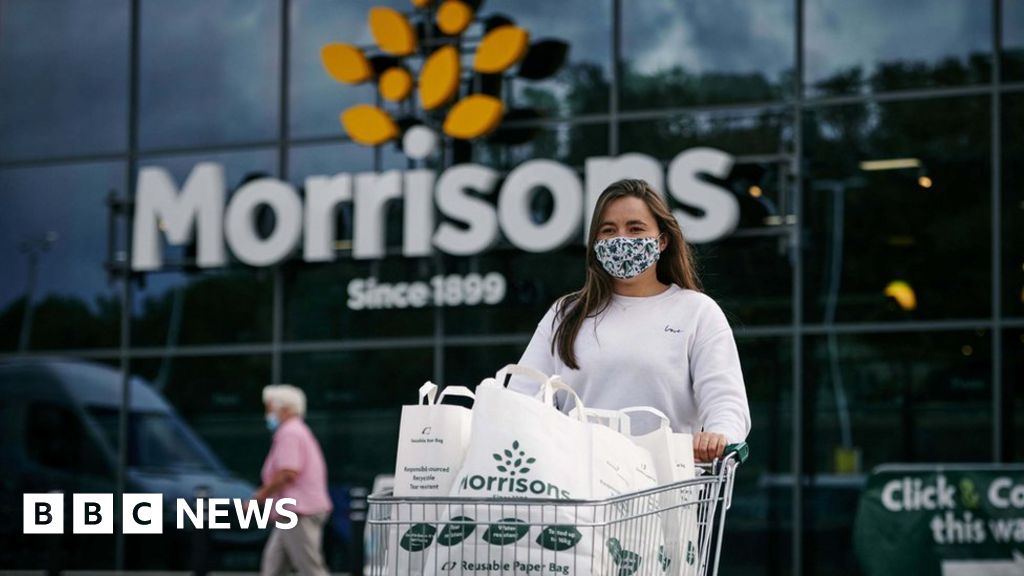PA copyright image Media Morrisons, the British supermarket chain, has accepted a £6.3 billion ($8.7 billion) buyout deal from a US investment group led by the owner of Majestic Wine. Last month, the grocery chain turned down a £5.5 billion offer from another company, claiming that it had grossly undervalued the business. Andrew Higginson, Morrisons chairman, said the revised offer was fair and that the firm would “continue to grow.” In the United Kingdom, the company has almost 500 stores and employs over 110,000 people. The buyout, backed by Fortress Investment Group of the United States, is subject to shareholder approval, although the supermarket group’s board are urging that it be approved unanimously. Under the terms of the agreement, shareholders will receive 254p per share, a 42 percent premium above Morrisons’ share price prior to the offer period, as a result of the revelation of Clayton Dublier & Rice’s rejected offer (CD&R). Mr Higginson claimed that the supermarket’s “performance during the pandemic” had enhanced its standing, allowing it to approach Fortress from a “hard-won position of strength.” According to him, the supermarket’s directors could see that Fortress had a “complete knowledge and comprehension of Morrisons’ core essence.” Fortress managing partner Joshua A Pack stated that the company was committed to becoming “excellent stewards of Morrisons.” The Canada Pension Plan and Koch Real Estate Investments, a subsidiary of Koch Industries, are supporting Fortress’s proposal. According to Russ Mould, investment director at stock broker AJ Bell, the American investors may have assumed Morrisons – the UK’s fourth largest supermarket group – was “unloved, poorly appreciated, and so under valued,” implying they were getting a good deal. Mr Mould went on to say that Fortress made it plain in its announcement that it did not intend to sell any of its real estate, which he believes was intended to reassure employees and the general public that this would not be a case of asset stripping by a private equity group. About 85 percent of Morrisons’ properties, including its supermarkets, are freehold. Seema Malhotra, Labour’s shadow business minister, said the government should scrutinize the takeover bid seriously and urged ministers to cooperate with the consortium to ensure that “critical obligations to protect the employees and the pension scheme are legally binding and met.” The government stated that it is dedicated to “keeping the UK open for business while safeguarding the welfare of British workers and investment in the UK.” Unite, the workers’ union, demanded “unbreakable guarantees” on jobs and conditions or it would refuse to participate in any transaction. Morrisons is “unique among UK supermarkets,” according to Unite’s national officer for road transport Adrian Jones, who represents the company’s warehouse and distribution workers. Following the confirmation of one takeover attempt earlier this month, the announcement of another was not surprising. Fortress and its partners are emphasizing that this will be a long-term investment rather than a one-time event. It has stated that it will back Morrison’s management’s current plan. The supermarket’s online offering is one area where it can improve. Fortress has also sought to allay any fears about the impact of its acquisition on the company, its workers, and its supplier chain. Supporting wages of at least £10 per hour, not modifying pension plans, and not anticipating “significant” retail sale-and-leasebacks are just a few examples. The fact that Morrisons owns the majority of its stores is seen as a great plus. However, Labour and the Unite union continue to press for more guarantees. If this acquisition goes through, it will reduce the number of publicly traded supermarkets in the United Kingdom, which is already small. The deal “signals the biggest shakeup in the UK food sector in over a decade,” according to Retail Economics’ Richard Lim, as the business grapples with changes brought on by the pandemic and post-Brexit supply chains. The fact that the board supported the proposal made it more likely to go through, according to Adam Leyland, editor-in-chief of trade newspaper the Grocer. This put pressure on CD&R, who could return with a follow-up bid. He said the manner in which an acquisition was made was significant, and that the Morrisons agreement, in which the consortium promised to “support the firm,” was different from the Issa Brothers’ Asda buyout. In that transaction, a major portion of the £6.8 billion purchase price was covered by borrowing, known as a leveraged buyout. Morrisons began as a market stand in Bradford in 1899, although the first Morrisons supermarket shop did not open until 1961. In 2004, the company paid £3 billion acquire competitor supermarket Safeway, giving them a larger share of the southern English market. Are you employed by Morrisons? Have your say by sending an email to haveyoursay@bbc.co.uk. If you are willing to speak with a BBC journalist, please include your phone number. You may also contact us by WhatsApp at +44 7756 165803 or by phone at +44 7756 165803. Have your say on Twitter: @BBC HaveYourSay Photographs or video can be uploaded. Please read our terms and conditions as well as our privacy statement. If you can’t see the form on this page, go to the BBC’s mobile website to submit your question or remark, or email us at HaveYourSay@bbc.co.uk. Any entry should include your name, age, and location. IS IT RETURNING HOME? : The triumph of England over Germany, as well as fan responses and predictions for tonight’s match PIECES OF BRITNEY: What do we know so far about the music star and her life? Morrisons/n
Read MoreMorrisons: Supermarket agrees £6.3bn takeover
2021-07-03T13:36:34-04:00July 3rd, 2021|





